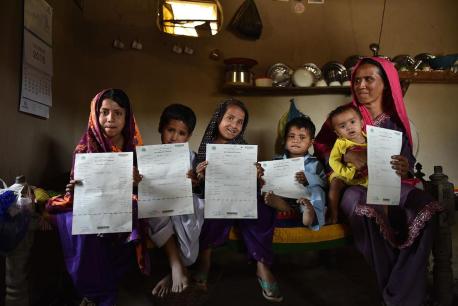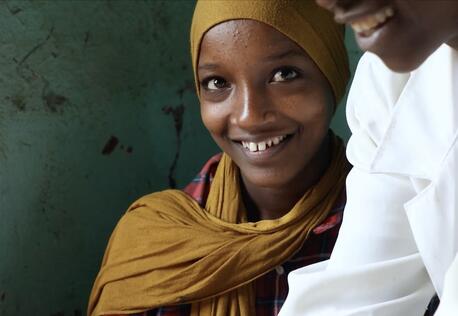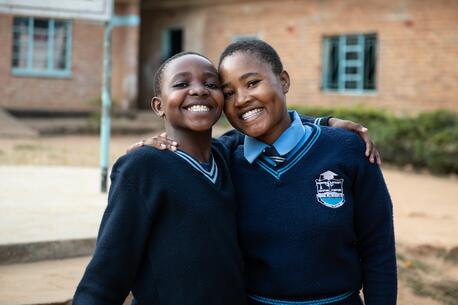
How UNICEF Is Leveraging Mobile Tech to Get Results for Children
Introducing digital birth registration in Pakistan is one way UNICEF is partnering to advance innovative new ways to help vulnerable kids.
UNICEF and partners are working tirelessly all over the world to save and protect children.
It is estimated that 5 million babies are born each year in Pakistan — but only about 1.5 million of them are registered at birth. The other 3.5 million? As far as the local government and the legal system are concerned, these children do not exist.
This is a problem. Birth registration is a prerequisite for obtaining a birth certificate, which is proof of legal identity for a child. Without a legal identity, children risk being overlooked by health and education systems. They are more vulnerable to exploitation and abuse. Those studying the issue attribute the country's 34% registration rate to poverty, lack of information and tedious birth registration processes.
But change is afoot. An innovative solution, launched by UNICEF in partnership with Telenor Pakistan — part of the Telenor Group-UNICEF global partnership — and local governments in areas within Sindh and Punjab provinces, allows parents to register their kids using a mobile phone. The process, enabled by Telenor's network infrastructure and other in-country technology assets, takes only a few minutes and can be completed at home.

Ali Asghar helps register children from the mosque he leads in his village Mehrab Solangi, in the Thatta district of Sindh province. © UNICEF Pakistan/Laghari
Local civil registrars and health workers are facilitating digital registrations, some going door to door. The workers collect and transmit the required birth-related information (including photos of the parents' own IDs) to the registration center, which then approves the request and issues the certificate.
Birth registration rates in areas where the service is being tested increased from 30% to 90% during the pilot phase alone, and now partners are working to expand the service into more districts.
Zainab Siddiqui, Telenor's Director of Sustainability, spoke about the project's impact at the recent Mobile World Congress in Barcelona: "We know that children from lower-income backgrounds generally have a very low chance of being registered at birth," Siddiqui said during an interview posted on Twitter. "But through this project, 580,000 girls and boys, mostly from rural backgrounds, now have a better chance at school enrollment, of being immunized and being protected and saved from things like child marriage, child labor and sex trafficking."
Through this project, 580,000 girls and boys, mostly from rural backgrounds, now have a better chance at school enrollment, of being immunized and being protected and saved from things like child marriage, child labor and sex trafficking.
Siddiqui continued: "Birth registration is not just a number or set of statistics. It lends credibility to other sets of data that feed into public policy, public planning and development initiatives" — projects like building schools and hospitals.
For UNICEF, legal proof of existence is a fundamental right of every child, and supporting the transition to digital birth registration in Pakistan is a way to protect that right. And like other private-sector partnerships, the Pakistan project is both a strategic leveraging of private sector resources and expertise in service to UNICEF's mission and an opportunity for the partner to contribute toward the UN's Sustainable Development Goals. Telenor and other tech partners are committed to helping reduce inequalities, the aim of SDG 10, focusing on digital skills for the 21st century.
By fostering collaboration across sectors, these partnerships build trust and support continuity in key programmatic areas. While working to scale digital birth registrations in Pakistan, Telenor and UNICEF are jointly developing child online safety programs in Bangladesh, Myanmar and other parts of East Asia, while exploring possible child protection programs in other Telenor markets.
Mobile connectivity can be a game changer for some of the world's most marginalized children. Nearly all (93%) of the world's refugees live in areas with 2G or 3G coverage, according to UNHCR, creating myriad opportunities to leverage mobile for humanitarian purposes — and inspiring a movement with the industry. The industry group GSMA (Global Speciale Mobile Association) has been working to bring together mobile operators and humanitarian organizations like UNICEF to strengthen the resilience, preparedness and response of connectivity systems and advance innovations that can help children and families.
The Telenor partnership in Pakistan is just one example. UNICEF is working with other mobile partners to leverage a new data sharing platform called Magic Box designed to improve on-the-ground response to epidemics and other disasters. Another project in Paraguay sends SMS messages to help mothers and fathers monitor a baby's health and development.
Learn more about how the GSMA Mobile for Humanitarian Innovation program is expanding its work to accelerate delivery and impact. Visit gsma.com/m4h.
Top photo: A mother in Pakistan with her five children: Bashira, 12, Shakeela, 8, Murtaza, 6, Sajan, 4, and Izra, 2, all recently registered and issued birth certificates using a new digital registration service launched by Telenor Pakistan in partnership with UNICEF. © UNICEF Pakistan/Laghari
HOW TO HELP
There are many ways to make a difference
War, famine, poverty, natural disasters — threats to the world's children keep coming. But UNICEF won't stop working to keep children healthy and safe.
UNICEF works in over 190 countries and territories — more places than any other children's organization. UNICEF has the world's largest humanitarian warehouse and, when disaster strikes, can get supplies almost anywhere within 72 hours. Constantly innovating, always advocating for a better world for children, UNICEF works to ensure that every child can grow up healthy, educated, protected and respected.
Would you like to help give all children the opportunity to reach their full potential? There are many ways to get involved.





